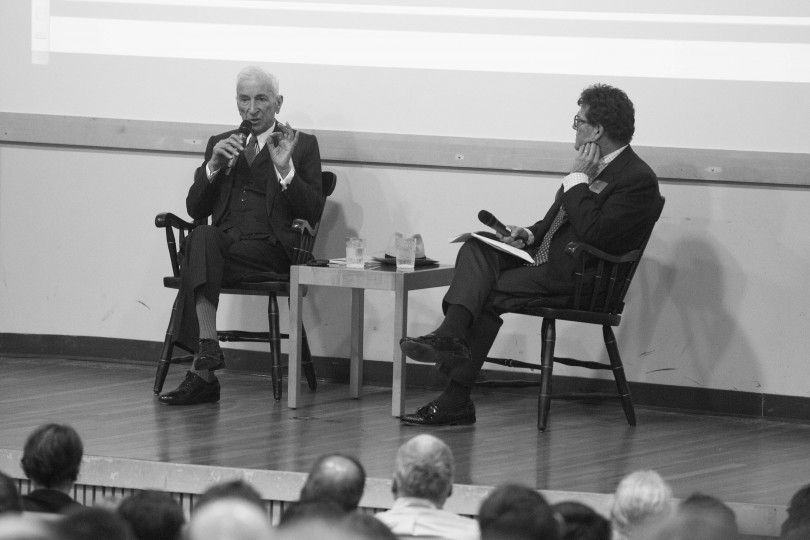By Libby Allen
BU News Service
If you’d told me a year ago that I’d be sitting in a conference room with Gay Talese, Mary Roach, Amy O’Leary, Fernanda Santos, and Nikole Hannah-Jones (and several others), I would have told you to go back to that tank of nitrous you were sucking on. But, as it happens, that is exactly where I found myself at around 1pm last Saturday afternoon. This happened directly after Gay Talese delivered to a 500-person audience what was supposed to be a conversation with College of Communication Dean Tom Fiedler, but what turned out to be an hour and a half monologue about his life.
What also happened during the Talese soliloquy was a poorly answered question on his part. A poorly answered question about women. A question about women writers, to a room full of writers, many of whom were women. The exact phrasing of Talese’s answer was immediately drowned out by a gross combination of accurate, inaccurate and opinionated retorts via Twitter from more than 500 reporters sitting in the auditorium where this misstep occurred. A solid chunk of whom decided to leave (though whether this mass evacuation was because of Talese’s imposition on lunch hour, or his ill-phrased remarks about women writers, we will never really know).
And who could blame them for walking out? Many of the women who contributed to the Twittersphere explosion are, quite simply, bad-ass journalists in their own right. They report from war zones and dangerous countries. They risk their lives to do what they do.
And perhaps the most criticized and hard-felt part of the entire exchange, from my perspective and many of my colleagues’ perspectives, was the lack of follow-up. There seemed a complete lack of immediate response at all by Tom Fiedler, who sat next to Talese on stage, or Mitchell Zuckoff, who stood next to both of them at the podium.
But what many in that auditorium took as sexist comments, others chalked up to the stale views of an equally stale 84-year-old man, with little weight measured in the world they live in now.
So there I sat in a conference room after the formerly strong-sailing Talese ship sank, with some of America’s most talented journalists, and The Man, The Legend, in the flesh. And nothing is spoken about what will be deemed the “Talese Fiasco.” So I picked at a turkey sandwich and pretended, like the rest of the journalists in the room, that nothing had happened.
But I desperately wanted to say something. Anything. To acknowledge the situation that just transpired. To disprove my insecurities and to affirm that, yes, I too am a journalist. I wanted to confront the issue. Because as a student, I had more to prove than anyone else in that room. I already don’t feel like The Savvy Journalist with myriad publications under my belt. But that is what I aspire to be. I don’t have The New York Times, or The Miami Herald, or The Boston Globe on my resume, as nearly everyone in that room did. And I wanted to acknowledge this thing, this elephant that was weighing down the conference table between all of us.
I thought someone would admit their frustrations to Talese. Surely Hannah-Jones would speak up (she had no hesitation doing so on social media). Surely Santos, with all her moxie, her sass, would push the button, would make him cave.
Nothing.
Talese regaled us all once more with his thoughts on GPSs and tape recorders. There were discussions about the placement of features in the Times and which news outlets he reads every morning when he wakes up. (For the record, he never reads The Atlantic; he just doesn’t have time for magazines). All the while, a shit-storm on social media was reigning down its fury upon a man dressed in a three-piece suit, eating a cheese-less ham sandwich in a conference room, with no idea how the world around him was reacting to his comments.
In the end, the men and women in that conference room stayed silent about the fiasco. They were too polite, myself included. Too hesitant to call out The Man, the canon-contributing writer. More than 500 reporters present in the auditorium that day unleashed quotes and misquotes, opinions both valid and absurd. And some of the sharpest minds in the business had the opportunity to address it directly, and didn’t.
When the dust finally settled that day, and Twitter slowed its roll, and drinks were had, and conversations were put away, and everyone awkwardly went on with their weekend, I couldn’t help but think that, for the duration of a sandwich and a bag of chips, I had the opportunity to speak up. And I stayed silent.





Congratulations for seeing something important that nobody else has noticed: that nobody in that room had the courage or character to speak their criticisms to talese face to face. It says a lot about the twitter era and how it encourages the worst of us to speak the loudest. I disagree 100 percent with your opinion of talese but i admire this column.